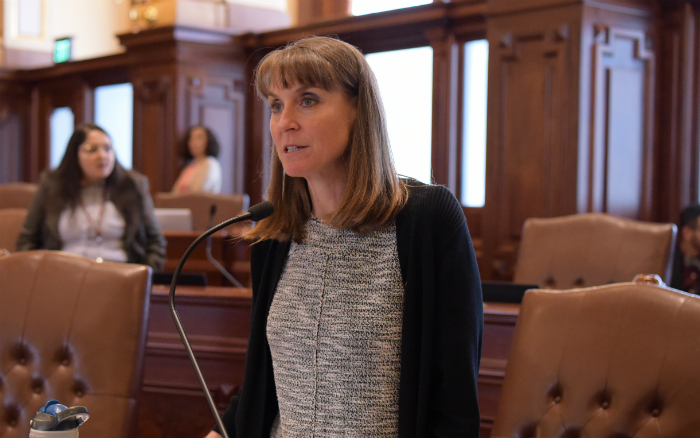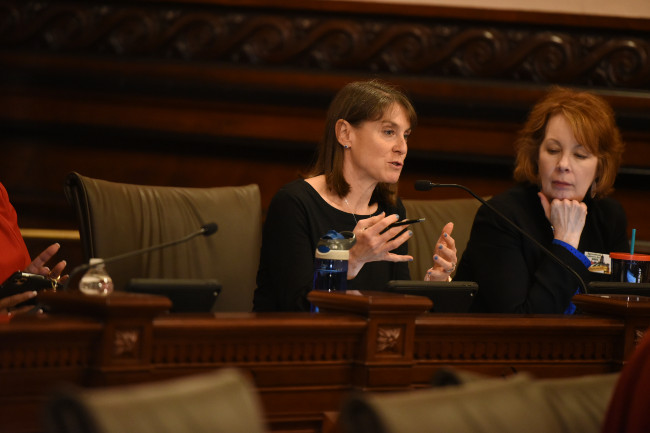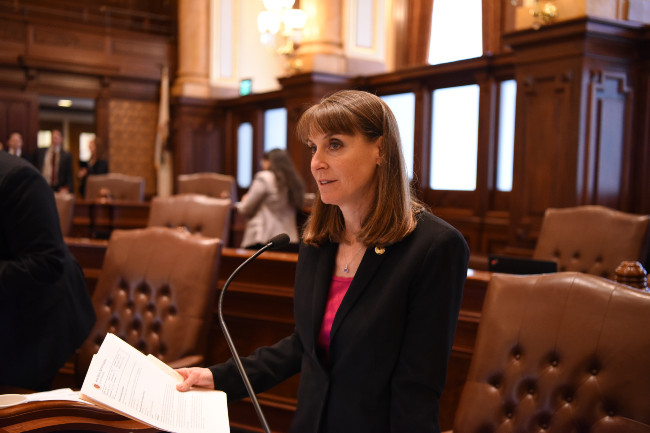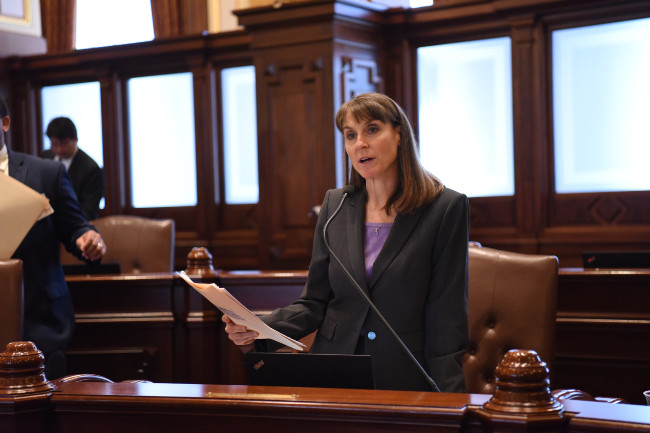Senator Fine urges community organizations to apply for grant funding
- Details
- Category: Press Releases
 GLENVIEW – As more Illinoisans lean on community organizations for food, shelter and other support, State Senator Laura Fine (D-Glenview) encourages community organizations providing services during the pandemic to contact the Illinois Criminal Justice Information Authority to apply for a portion of $7.1 million in newly approved grants.
GLENVIEW – As more Illinoisans lean on community organizations for food, shelter and other support, State Senator Laura Fine (D-Glenview) encourages community organizations providing services during the pandemic to contact the Illinois Criminal Justice Information Authority to apply for a portion of $7.1 million in newly approved grants.
“As a result of the COVID-19 crisis, more families are struggling with food insecurity, homelessness, mental health and more,” said Fine. “This program offers support to the critical community organizations our friends and neighbors are relying on.”
ICJIA’s Coronavirus Emergency Supplemental Funding Program assists groups that provide support and oversight to a network of community-based organizations. The lead entities may distribute funds via sub-grants or propose a competitive sub-grantee selection process. ICJIA is giving priority to organizations that operate in the areas hardest hit by the pandemic. Grants must be used for housing, supportive services, agency support or food security.
Organizations can find more information and apply for funding here by July 24. ICJIA will notify applicants of their status by Aug. 10.
Fine invites residents to submit nominations to Senior Illinoisans Hall of Fame
- Details
- Category: Press Releases
 GLENVIEW – To recognize older adults who have contributed to their communities through service, education, the workforce or the arts, State Senator Laura Fine (D-Glenview) invites residents to submit their nominations to the Senior Illinoisans Hall of Fame.
GLENVIEW – To recognize older adults who have contributed to their communities through service, education, the workforce or the arts, State Senator Laura Fine (D-Glenview) invites residents to submit their nominations to the Senior Illinoisans Hall of Fame.
“Especially during this challenging time, it’s important to lift up those special individuals making a difference in our communities,” said Fine. “If you have an older friend, family member or neighbor who deserves recognition for their efforts, I encourage you to nominate them.”
The Senior Illinoisans Hall of Fame celebrates outstanding accomplishments in community service, education, the labor force and the arts. Each year, four candidates—one from each category—are inducted.
Eligibility is based on an individual’s past and present accomplishments, and the candidate must be a current Illinois citizen or a former citizen for most of their life. Posthumous nominees are also considered.
Since its creation in 1994, 121 people have been inducted into the Senior Illinoisans Hall of Fame.
“During the COVID-19 pandemic, many older adults have been stuck in their homes, but that hasn’t stopped them from making an impact on our lives,” said Fine. “Nominating a friend or loved one to the Senior Illinoisans Hall of Fame is a great way to show them you care.”
The Illinois Dept. on Aging has extended the submission deadline through Monday, Aug. 31. Nominations may be submitted online or by calling the Senior HelpLine at 1-800-252-8966.
Senator Fine expands treatment options for sexual assault survivors during the pandemic
- Details
- Category: Press Releases
 GLENVIEW – To ensure survivors of sexual assault have access to treatment even during a pandemic, State Senator Laura Fine (D-Glenview) is drawing attention to a new law that would allow any federally qualified health center to administer medical forensic exams, also known as rape kits, during a public health crisis like the COVID-19 outbreak.
GLENVIEW – To ensure survivors of sexual assault have access to treatment even during a pandemic, State Senator Laura Fine (D-Glenview) is drawing attention to a new law that would allow any federally qualified health center to administer medical forensic exams, also known as rape kits, during a public health crisis like the COVID-19 outbreak.
“Hospitals are crowded and risky areas right now, which may deter people from seeking care after they have experienced sexual assault,” Fine said. “This law enables survivors to seek justice quickly and safely, even during a public health crisis.”
Senate Bill 557 allows approved federally qualified health centers to perform rape kit examinations and collection during public health emergencies like COVID-19.
“It’s important that we give survivors a safe place to get help,” Fine said. “Expanding treatment options ensures anyone can access the care they need, when they need it.”
The bill was signed into law Friday and took effect immediately.
Senator Fine: New budget acknowledges need for supportive government services during COVID-19 pandemic
- Details
- Category: Press Releases
 SPRINGFIELD – As Illinois continues to grapple with the COVID-19 pandemic, State Senator Laura Fine (D-Glenview) hopes the state’s most vulnerable populations will see relief under a state budget that increases funding to human services agencies providing food, financial assistance and other aid.
SPRINGFIELD – As Illinois continues to grapple with the COVID-19 pandemic, State Senator Laura Fine (D-Glenview) hopes the state’s most vulnerable populations will see relief under a state budget that increases funding to human services agencies providing food, financial assistance and other aid.
“The COVID-19 pandemic hasn’t been easy on anyone, but our seniors and people with disabilities have been hit particularly hard,” said Fine. “I’m pleased to see a budget that prioritizes the human services agencies supporting people through these difficult times.”
The budget includes $86.8 million for the Illinois Department on Aging to provide home-delivered meal services to older adults, who may be unable to access food during the pandemic without significant risk to their health. The budget also increases funding to the Community Care Program by nearly $28 million to help people who might otherwise need to go to an assisted living facility to stay in their homes.
To provide relief to the many people with disabilities who have found themselves ill or isolated from friends and family during this crisis, the budget increases funding to help care for people with developmental disabilities by approximately $90 million. It also increases funding for the Home Services Program, which helps people with disabilities live independent lives in their own homes, by more than $110 million.
“As a result of the virus, supportive government services are needed more now than ever before,” said Fine. “I’m glad to see a state budget that acknowledges the need for the government to step up and provide aid to those hurting.”
The budget is contained in Senate Bill 264. The governor signed it into law Wednesday, and it takes effect July 1.
More Articles …
Page 62 of 78








